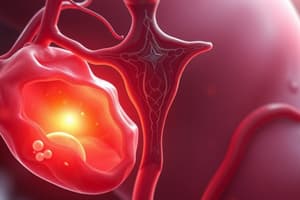Podcast
Questions and Answers
What is the result of human reproduction?
What is the result of human reproduction?
- Formation of zygote
- Interaction between male and female reproductive systems
- Creation of gametes
- Human fertilization to produce a human offspring (correct)
What is the genetic composition of gamete cells?
What is the genetic composition of gamete cells?
- 92 chromosomes
- 23 single chromosomes (correct)
- 46 chromosomes
- 23 pairs of chromosomes
What is the outcome of the merger of the ovum and sperm?
What is the outcome of the merger of the ovum and sperm?
- Creation of gametes
- Development of gestation period
- Formation of a zygote (correct)
- Initiation of embryogenesis
What is the process called when two gamete cells merge into one zygote cell?
What is the process called when two gamete cells merge into one zygote cell?
What initiates the 9-month gestation period in human reproduction?
What initiates the 9-month gestation period in human reproduction?
Flashcards are hidden until you start studying
Study Notes
Human Reproduction
- The result of human reproduction is the formation of a zygote, which develops into a fetus and eventually a baby.
Gamete Cells
- Gamete cells, also known as sex cells, have a genetic composition of 23 chromosomes, which is half the number of chromosomes found in somatic cells.
Fertilization
- The merger of the ovum (egg cell) and sperm results in a zygote with a complete set of 46 chromosomes, combining the genetic material from both parents.
- The process of merging two gamete cells into one zygote cell is called fertilization.
Gestation Period
- The fusion of the sperm and ovum during fertilization initiates the 9-month gestation period in human reproduction, during which the fertilized egg develops into a fetus.
Studying That Suits You
Use AI to generate personalized quizzes and flashcards to suit your learning preferences.



